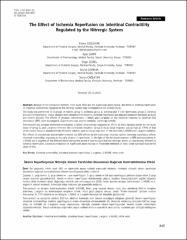| dc.contributor.author | Caglayan, F | |
| dc.contributor.author | Sahin, A | |
| dc.contributor.author | Gunel, E | |
| dc.contributor.author | Cakmak, M | |
| dc.contributor.author | Caglayan, O | |
| dc.date.accessioned | 2020-06-25T17:40:15Z | |
| dc.date.available | 2020-06-25T17:40:15Z | |
| dc.date.issued | 2004 | |
| dc.identifier.citation | Çağlayan, F., Şahin, A. S., Günel, E., Çakmak, M., Çağlayan, O. (2004). The effect of ischemia reperfusion on intestinal contractility regulated by the nitrergic system. Turkish Journal of Veterinary and Animal Sciences, 28(5), 845 - 850. | en_US |
| dc.identifier.issn | 1300-0128 | |
| dc.identifier.uri | https://hdl.handle.net/20.500.12587/3363 | |
| dc.description | WOS: 000226210000010 | en_US |
| dc.description.abstract | Because of the interaction between nitric oxide (NO) and the superoxide anion radical, the effect of ischemia-reperfusion on intestinal contractility regulated by the nitrergic system was investigated in the present study. The study was performed on 3 groups of rabbits: group 1, ischemia; group 2, ischemia and 1 h of reperfusion; group 3, ischemia and 24 h of reperfusion. Tissue samples were obtained from ischemic, ischemia-reperfused and adjacent uninjured intestines as study and control samples. The effects of atropine, tetrodotoxin, L-NAME and L-arginine on the intestinal response to electrical field stimulation (EFS) were investigated. Guanethidine was used to minimize adrenergic activity. Tetrodotoxin and atropine prevented contractions. L-NAME enhanced the responses to EFS in all tissue samples except for the study tissue of group 2, and L-arginine reversed this contraction elevation. Group 2 study tissue response was as high as 170% of that of the control tissue in standard Krebs-Henseleit solution, and no change was seen on this level with L-NAME and L-arginine addition. The effects of tetrodotoxin and atropine revealed that EFS affects via the cholinergic neuronal system. Ischemia reperfusion affects intestinal contractility, especially in the early phases of reperfusion. In the light of the increased response to EFS and insensitivity to L-NAME and L-arginine of the affected tissue during this period it was thought that the nitrergic system is considerably affected by ischemia reperfusion. Excessive production of superoxide anion radicals or reversible inhibition of nitric oxide synthase may be the cause of this. | en_US |
| dc.language.iso | eng | en_US |
| dc.publisher | Scientific Technical Research Council Turkey | en_US |
| dc.rights | info:eu-repo/semantics/openAccess | en_US |
| dc.subject | intestinal contractility | en_US |
| dc.subject | intestinal ischemia reperfusion | en_US |
| dc.subject | L-arginine | en_US |
| dc.subject | L-NAME | en_US |
| dc.subject | nitric oxide | en_US |
| dc.title | The effect of ischemia reperfusion on intestinal contractility regulated by the nitrergic system | en_US |
| dc.type | article | en_US |
| dc.contributor.department | Kırıkkale Üniversitesi | en_US |
| dc.identifier.volume | 28 | en_US |
| dc.identifier.issue | 5 | en_US |
| dc.identifier.startpage | 845 | en_US |
| dc.identifier.endpage | 850 | en_US |
| dc.relation.journal | Turkish Journal Of Veterinary & Animal Sciences | en_US |
| dc.relation.publicationcategory | Makale - Uluslararası Hakemli Dergi - Kurum Öğretim Elemanı | en_US |
















